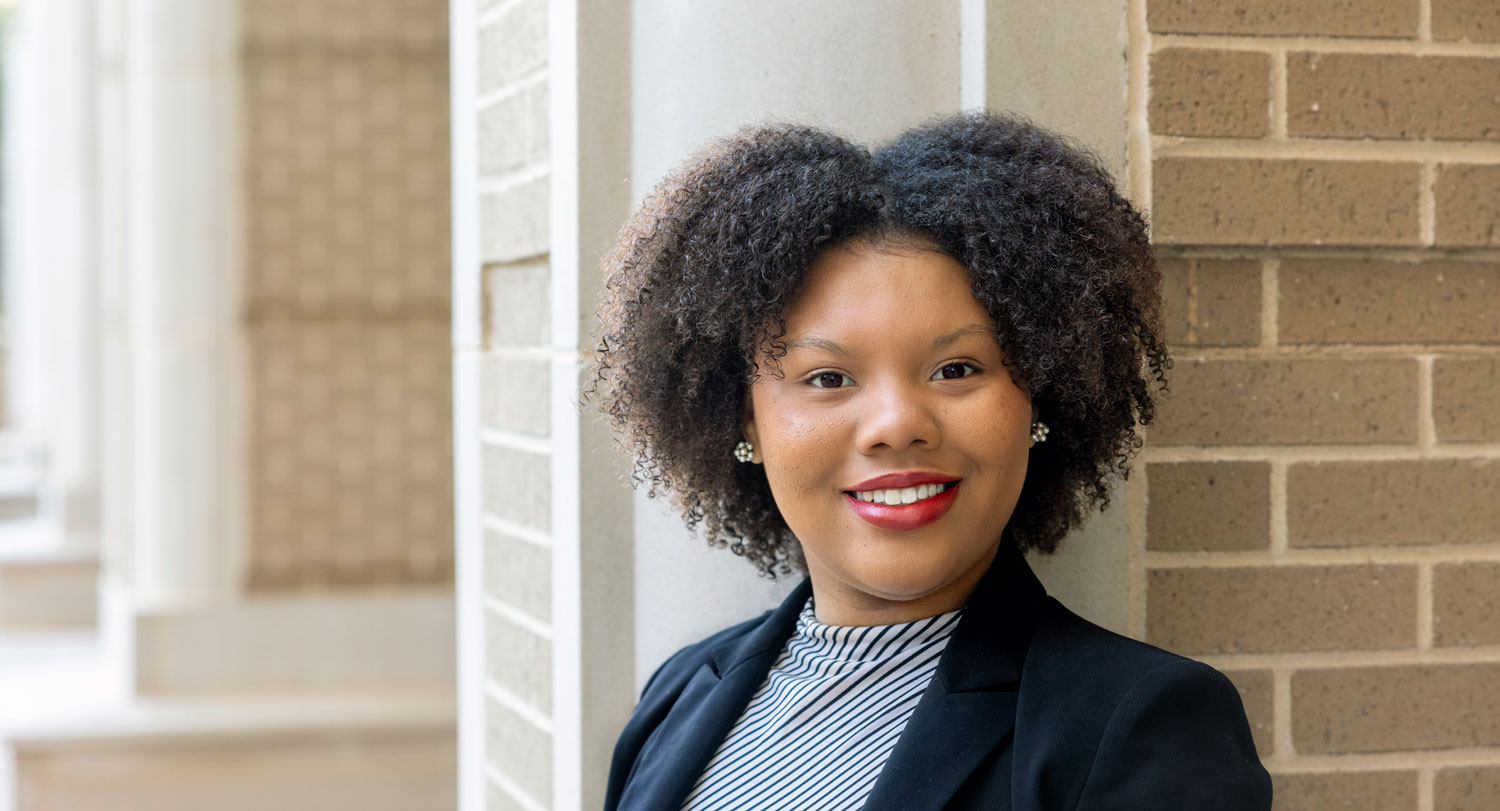
Through her studies at the Arnold School of Public Health, first-generation USC student Ebony Christie has realized the everyday impact of safety and wellness initiatives.
“Everything we do in our lives is because of the efforts of public health,” says Christie, a senior who now has set her sights on becoming an OB/GYN. “If you have data to prove something is happening, people are open to solving it,” Christie says. “It's unfortunate that bad things have to happen for change to occur.”
Christie aspired to be involved in medicine from the time she started at USC. She began as a biology major and then an education major but discovered neither felt like the right fit.
Going into her junior year, Christie worked at Columbia’s Free Medical Clinic to gain experience alongside other students on a pre-med track.
“They were talking about how wonderful public health is,” Christie says, “and how it gives you a broader perspective on what health care is like and the role physicians play.”
She changed her major to public health, and it clicked from her first course in Health Promotion, Education and Behavior.
“I knew that was where I was supposed to be, even though it took me a while,” Christie says.
Finding her focus
With her major changed to public health, Christie and a partner in a project-based class explored issues in Black maternal health across South Carolina. Their research revealed alarming statistics about the state’s rising maternal mortality rate.
“It was shocking and worrisome,” Christie says of learning of issues like South Carolina earning the nickname “Cradle of shame” for its infant mortality rate, which in 2021 was 7.3 deaths per 1,000 live births.
“On the flip side, I’m getting to see groups of people who are working to make it better,” she says.
Understanding public health enables you to be a better physician for your patients.
During the summer of 2024, Christie was offered an opportunity for undergraduate students to participate in a TRIO Ronald E. McNair Program for a six-week intensive led by Tegia Coleman-Rochester. Under faculty mentor Daniel Cooper, a psychology assistant professor, Christie researched perceived discrimination and how it impacts the birthing experiences of Black women. It included asking questions from a discrimination scale, such as, “Did you feel like you weren't listened to?” or if there was a lack of courtesy.
She uncovered obstacles that included women having induced medical procedures and feeling judged for seeking medication.
For her fall 2024 research, Christie began examining the prevalence of cesarean sections in the Black community and its impact on breastfeeding. Her faculty mentors were Tisha Felder and Curisa Tucker, whose research includes encouraging African American mothers to breastfeed. Christie pursued research showing that when a mother’s body does not go through a vaginal delivery, the signals from the natural birthing process that induce lactation are not sent.
Christie found that Black mothers who had a cesarean birth are put at a disadvantage. “A lot of it as to do with barriers, lack of education and cultural incompetency from providers in not being able to understand how to appropriately help African American mothers who want to breastfeed,” she says.
“The more we share their stories, the more we have data that proves there are health gaps within our system,” Christie says. “Something needs to be done.”
Advocacy and outreach
In recounting all her activities since becoming a public health major, Christie thinks back to her search for direction when she first arrived on campus. “When I first got here, it was really hard trying to navigate such a huge space,” Christie says. After finding the right fit, she has channeled her energy into becoming a dedicated advocate for Black maternal health.
Christie drew local media coverage in April when she approached Columbia City Councilwoman Aditi Bussells to launch the city’s first Black Maternal Health Week. This included an open dialogue on campus where women shared stories of being ignored by care providers during pregnancy.
Christie’s hard work hasn’t gone unnoticed. TRIO Program Director Althea Counts sent Christie a note to say how proud she was of not only watching her accomplishments but seeing her personal growth. Counts invited Christie to be featured at the Dawn Staley Champions Fund event, where Christie was part of a live interview with WIS news anchor Judi Gatson. During the interview, the conversation delved into Christie’s plans of becoming an OB/GYN.
“How I spoke was really heartfelt,” Christie says. “I was praying, God, please don’t let me stumble.”
The WIS interview led to networking connections within Columbia’s medical community, including a video call with Dr. Berry Campbell, the chair of the obstetrics and gynecology department at USC’s School of Medicine Columbia.
“Hearing him telling me about the MCAT and ‘I want you to get in. I want to call you my colleague one day,’ was really cool,” Christie says. “I feel like God is really working it out in mysterious ways for me.”
A future in public health
With plans to pursue a master’s in public health before attending medical school, Christie is determined to address systemic health disparities as an OB/GYN. Her dreams include opening her own clinic, creating internships and scholarships for underrepresented students, and advocating for health equity at the governmental level.
For now, Christie remains focused on balancing her responsibilities and her passions.
“Public health helped me realize that I can create what I want,” she says. “Understanding public health enables you to be a better physician for your patients.”